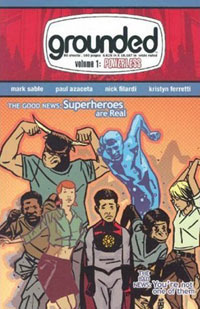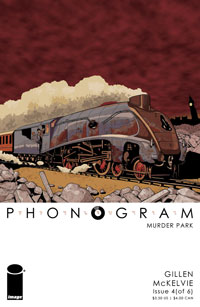
I’m feeling terribly mainstream these days, living mostly on a steady diet of DC comics. The number of regular Batman comics may have been trimmed, but there’s been the thoroughly enjoyable gothic entertainment of Matt Wagner’s excellent eight-part Mad Monk to fill some of the space, and anyway, Grant Morrison was in there with a wonderfully witty story arc for the Batman title at the end of 2006. John Ostrander and Tom Madrake’s ‘Grotesk’ arc for the same title sadly isn’t anywhere near as inventive or engaging, but they do at least have some rather gorgeous covers by Gregory Lauren. There are more great covers over on Detective Comics, where the Paul Dini storylines have been universally excellent over the past six months. Dini pitches Batman as the great detective, and for me, that’s where he really belongs. The slightly sordid and seedy edge to the storylines is steeped in pulp Noir, and it allows Batman to come across more as a flawed heroic gumshoe than as a superhero. Which is exactly as it should be.
Image comics may not be as mainstream an imprint as DC, but it can’t be far off. They have been responsible for publishing some of my favourite comics ever, notably with the iconic Powers series by Brian Michael Bendis and Michael Avon Oeming. Powers really did alter my world significantly. Up until then I never had the nerve to allow myself access to the world of the superhero, and Powers was an astonishingly powerful bridge between the worlds of spandex and inky underground comix. And speaking of Michael Avon Oeming, be sure to check out his Cross Bronx four-part series, no doubt soon to be collected as a trade paperback. Supernatural crime thrillers were never so good as this.

Also from Image were Bendis’ magnificent Torso and Goldfish titles, and what about B. Clay Moore and Jeremy Haun’s excellent Battle Hymn from 2006? Battle Hymn played the post-modern self-referencing game with a great deal of aplomb, and emerged as a fine play on the Golden Age of comics as well as a worthy musing on notions of modernity and conflict. Of course that kind of thing has been done numerous times in the past, most notably in the rightly seminal Watchmen, but that doesn’t mean it can’t be done again.
Indeed, thinking about Battle Hymn, it strikes me that the world of (superhero) Comics has, even more than the world of music, held the very essence of the post-modern nature of Pop culture. Existing on a set of codes built within a relatively small timescale, the comics have existed in a continual feedback loop of self-reference for well over half a century.
Like Battle Hymn, volume one of Mark Sable and Paul Azaceta’s Grounded plays on this feedback loop, this time with an entertaining tale set in a High School for superheroes. Think X-Men crossed with Freaks and Geeks and you are getting close. The neat twist in the tale, however, is that whilst lead character Jonathan spends his childhood immersed in comics, convinced of his own superhero powers, he is in fact as mortal as you or I. Explaining quite how he ends up in this strange Spandex High would be to give away too much, but suffice to say that there is something of the clouded relationship between parent and child in the mix. And really, Grounded is a musing on the nature of the child/parent (or fan/hero, if you like) axis: an exploration of the relationships between celebrities and their children and amongst children themselves. It’s also about our beliefs in systems and individuals, about standing out and fitting in, about the trials and tribulations of growing up. Highly recommended.

My favourite comic from Image recently though has been Kieren Gillen and Jamie McKelvie’s Phonogram; a six-part series with a trade paperback (sub-titled ‘Rue Brittania’) due in March. The title should of course tell you right away that this is a comic about music, but in case it wasn’t obvious enough, McKelvie’s gorgeous covers pay perfect homage to a variety of early ‘90s ‘britpop’ era albums from the likes of Elastica, Black Grape, Oasis, Suede and the Manics. You may recognise Gillen as a contributor to this very magazine, and his journalist credentials certainly shine through in Phonogram. But whilst the comics are ineffably a celebration of the magic of music, they are also a critique that lays bare the strange love/hate affair that writers often have with the media that they analyse and review. In some respects then Phonogram is a brave new take on music journalism. It’s also fiction.
Now I happen to think that there is something incredibly difficult in attempting to cross the threads of fiction and Pop contextuality. Show me a novel that attempts to weave Pop music references into its body and I will show you a hopeless mess. High Fidelity? Oh please… These difficulties of successfully blending fictional storytelling with specific Pop history must have dwelt strongly on the mind of Gillen and McKelvie, but I’m delighted to say that it really is a case of comics rising to meet the challenge. For Phonogram is unreservedly successful. Maybe it’s because comics and Pop music are both so firmly rooted in the Modernity (and thence the Post-Modernity) of the 20th Century and do not therefore have the historical baggage of the novel to fight against. As media, they grew up more or less together and maybe it’s just me, but they seem to me to have had a symbiotic relationship certainly ever since the late 1950s and early 1960s. The connections are seldom so obviously drawn as in Phonogram, but they nevertheless thread themselves across the ether, throwing creative energies back and forth.
In Phonogram those creative energies are held as high as Subway Sect once held their guitars. And that’s mighty high. Sure, you might not agree with the focus on this group or that, but that’s partly the whole point, and not the point at all. For Phonogram, like any great music journalism, uses limiting specifics to deal with broader themes and ideas; the nature of friendships, communities, shared and individual experiences, the magical ability of art to generate lines of entrapment that bind us together and thrust us apart. Phonogram is pure Pop Art, and for that we should be more than thankful.
© 2007 Alistair Fitchett